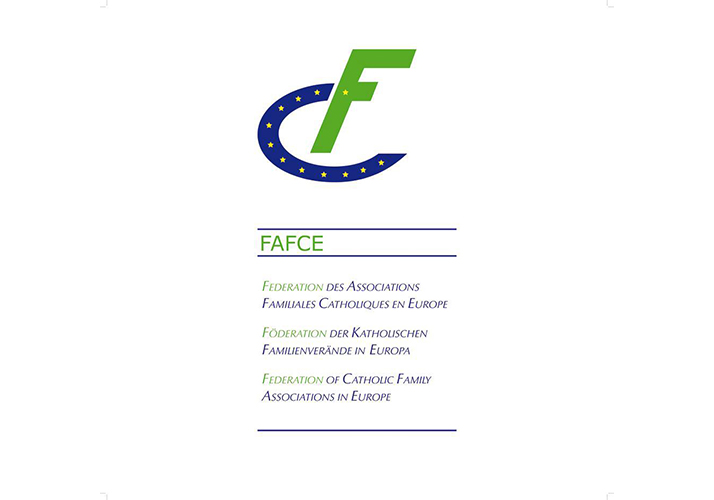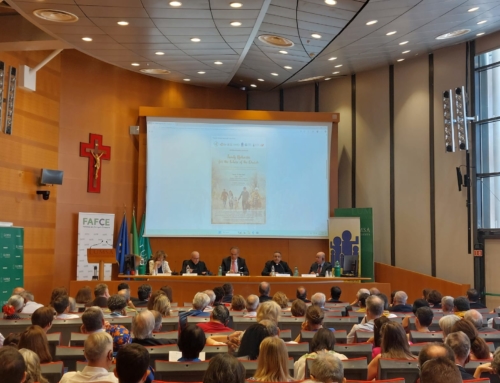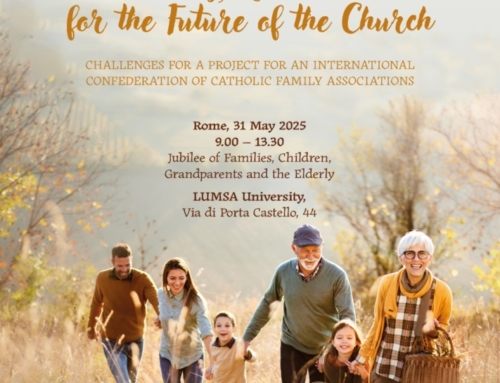Protecting minors from pornography
Maria Hildingsson, Secretary General of FAFCE
European Parliament, Brussels, 8 February 2017
Why would one not protect children from pornography? We have heard about the consequences of the exposure of children to pornography and there is no doubt that pornography is harmful for minors. The only reason I could see for not preventing children being exposed to pornography is money.
It is difficult to get the full picture of the pornographic industry, but at least it stands clear that it is a massive and destructive industry. In 2015, NBC News reported that the pornographic industry is worth an estimated $97 billion globally[i].
There is an evil circle between pornography, sexual exploitation and abuse and human trafficking. Sexual exploitation is the main reason for trafficking in Western and Central Europe. In other words there is a great demand which provides for lucrative business for traffickers. According to a study by the European Parliament on Sexual exploitation and prostitution from 2014 “human trafficking for sexual exploitation is considered one of the most lucrative illicit businesses in Europe, with criminal groups making about $3 billion from it per year”.
The same study states that “according to a report published in 2012[ii], prostitution is a global phenomenon and involves around 40-42 million people of which 90% are dependent on a procurer. 75% of them are between 13 and 25 years old[iii]”, implying that there is a big proportion of minors. “The prostitution market is a highly globalized and “industrialised” phenomenon where millions of women and children from deprived backgrounds all over the world are bought and sold by criminal circles to macro brothels which can exploit hundreds of victims at once[iv].”
Pornography cannot be detached from this harsh reality. A study with 854 women in prostitution in 9 countries showed that almost half were filmed while in prostitution to produce pornographic contents[v]. Traffickers force their victims to watch pornography to train them and film their sexual acts to exert psychological control over victims and to increase their financial gains[vi]. On the other hand, people who watch pornography are more likely to look for paid sexual encounters[vii], thus fueling the demand for prostitution and contributing to sex trafficking.
The victims of this industry, the victims of sex trafficking of whom a substantial part are children are an additional reason to prevent children from being exposed to pornography which is the first step in the cycle of consumption and addiction.
With the widespread use of mobile devices it becomes increasingly difficult for parents, teachers and educators to protect children from the exposure to pornography. The average age for the first use of internet among European children is 7 years. 75% of 15-16 years old people use the internet daily[viii]. A UK study found that, on average, children aged 5-16 spend 6.5 hours a day on screens[ix].
Exposure of minors to pornography is widespread in Europe. In Italy, a survey found that 67% of boys aged 14-19 and 15% of girls have watched pornographic material. In Sweden, 92% of boys and 57% of girls of 15-18 years of age have watched pornography[x]. Exposure to pornography can happen even earlier: in the UK, a survey of children aged 11-16 found that more than half of them were exposed to such contents[xi].
The family is the basic unit of Society, it is the smallest context of social relations. One of the main missions of the family is education which is an immense contribution to Society. The mother and the father are the first and foremost educators of their children and have the right to choose the education they prefer for their children, including relationship and sexual education. It is within the family than children will first learn about dignity and respect for oneself and others, both mentally and physically. A sound understanding of the importance of dignity and respect will equip children in the context of relationships and sexuality.
Parents also have the right to support in their educational mission and Society at large has a duty to provide appropriate conditions for the upbringing of children.
In the context of preventing exposure of children to pornography parents and educators need tools that enable them to protect children. The constantly increasing access to screens, especially through mobile devices, induces a need for protective instruments that are up to date. Legislators, including the European Union, have a duty to search for ways to guarantee the protection of minors from harmful contents on the internet and TV. The European Parliament will vote on the new Audiovisual Directive on 22 March next and it is an opportunity to maintain and improve the protection that is foreseen by the current directive:
Article 27 of the current directive:
- “Member States shall take appropriate measures to ensure that television broadcasts by broadcasters under their jurisdiction do not include any programmes which might seriously impair the physical, mental or moral development of minors, in particular programmes that involve pornography or gratuitous violence.”
However, the new version of the directive does not foresee the same degree of measures to prevent children from being exposed to harmful content. Even worse, the relevant Committees in the European Parliament have watered down the text further.
According to some proposals to amend the Audio Visual Media Services Directive the terms “minors’ physical, mental or moral development” are replaced by “minors’ physical or mental development” throughout the text, thus removing the notion of ‘moral development’. Nevertheless, the concept of “moral development” is part of EU and international law:
- Article 32 of theCharter of Fundamental Rights of the European Union;
- Articles 27, 32 of the UN Convention on the Rights of the Child,
- Article 17 of the UN Convention on the Rights of the Child could be mentioned as well, as it refers to the concept of “moral well-being” related to the mass media,
- UN General comment No. 13 (2011) on the rights of the child to freedom from all forms of violence
- Article 7.2 of the European Convention on Transfrontier Televisionof the Council of Europe (signed and ratified by 21 Member States, including Italy and Germany): “All items of programme services which are likely to impair the physical, mental or moral development of children and adolescents shall not be scheduled when, because of the time of transmission and reception, they are likely to watch them“.
We wish to take this opportunity to call on all Members of this House to reconsider the text of the new directive, in the interest of children. We have launched a call to MEPs that NGOs and other actors that work to protect children are welcome to sign.
FAFCE is deeply concerned by the fact that the ban on pornography and gratuitous violence on TV channels in the current directive is cancelled by the proposal of the European Commission. We call on the European Parliament to reinstate and enlarge the protection of minors’ physical, mental and moral development to on-demand services, e.g. Netflix, and video sharing platforms, e.g. Youtube.
[i] “Things Are Looking Up in America’s Porn Industry”, NBC News, 20/01/2015: http://www.nbcnews.com/business/business-news/things-are-looking-americas-porn-industry-n289431
[ii] 49 Fondation Scelles: http://infos.fondationscelles.org/
[iii] « La prostitution en pleine expansion, femmes et mineurs en première ligne », Le Monde, 27/01/2012 : http://www.lemonde.fr/societe/article/2012/01/27/la-prostitution-en-pleine-expansion-femmes-etmineurs-en-premiere-ligne_1635638_3224.html
[iv] References to some famous macro brothels in the EU: « Open for business: the brothel with 1,800 prostitutes » The Independent, 23/10/2010: http://www.independent.co.uk/news/world/europe/open-for-business-the-brothelwith-1800-prostitutes-2114265.html ; « Europe’s brothel – in a corner of Spain », The Guardian, 24/06/2006 : http://www.guardian.co.uk/world/2006/jun/24/spain.gilestremlett ; « Spain police smash ring that ran six large brothels », The Global Post, 4/03/2013 : http://www.globalpost.com/dispatch/news/afp/130304/spain-police-smash-ring-ran-six-large-brothels; « Europe’s biggest brothel – complete with coach parking- to open in Austria », The Telegraph, 05/11/2012: http://www.telegraph.co.uk/news/worldnews/europe/austria/9655537/Europes-biggest-brothel-complete-withcoach-parking-to-open-in-Austria.html
[v] Farley, M. (2007). “‘Renting an Organ for Ten Minutes:’ What Tricks Tell us about Prostitution, Pornography, and Trafficking”. In Pornography: Driving the Demand for International Sex Trafficking: http://www.prostitutionresearch.com/FarleyRentinganOrgan11-06.pdf
[vi] http://www.humantraffickingsearch.net/wp1/the-connection-between-sex-trafficking-and-pornography
[vii] Monto, M. A. (1999). “Focusing on the Clients of Street Prostitutes: A Creative Approach to Reducing Violence against Women”. Summary Report for National Institute of Justice: https://www.ncjrs.gov/pdffiles1/nij/grants/182859.pdf







